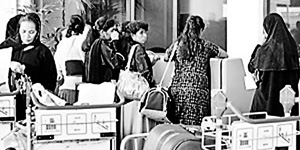In sight but out of mind: Sri Lanka’s domestic work sector
The past two decades have witnessed a significant increase in the worldwide demand for domestic work. In a number of countries, domestic work exists as an occupation where women constitute an overwhelming majority of the workforce.
 According to a recent global and regional estimate released by the International Labour Organisation (ILO), at least 52.6 million women and men above the age of 15 were listed as being domestic workers, with women constituting 83 per cent of the total figure. In other words, one in every 13 women participating in the labour force will be a domestic worker.
According to a recent global and regional estimate released by the International Labour Organisation (ILO), at least 52.6 million women and men above the age of 15 were listed as being domestic workers, with women constituting 83 per cent of the total figure. In other words, one in every 13 women participating in the labour force will be a domestic worker.
In 2011, the International Labour Organisation (ILO) adopted the Domestic Work Convention 2011 (C189) and it’s supplementing Recommendation Concerning Decent Work for Domestic Workers (R201). These documents were targeted at strengthening and implementing national laws and policies to enable Member States to deal with the growing vulnerability in the domestic work sector.
To date, 14 countries including the Philippines, South Africa, Uruguay, and Mauritius have ratified C189. Despite the fact that the current Government has expressed an interest in reforming its informal sector – Sri Lanka is yet to ratify the convention. Using C189 as a starting point, in January 2014 Verité Research set out to study the legal and socio-economic status of domestic workers in Sri Lanka.
In Sri Lanka, the domestic work sector constitutes around 87,400 workers – 60,400 of whom are female. Notwithstanding these significant numbers, domestic work remains a virtually invisible form of employment in Sri Lanka. One cause of this invisibility is the fact that a considerable proportion of domestic work is performed in private households outside the scope or application of legal and institutional frameworks. Consequently, at present, domestic work is excluded from the protection of Sri Lanka’s labour law framework – leaving the worker unable to seek recourse for discriminatory and exploitative labour practices. Unsurprisingly, this phenomenon has resulted in domestic work being one of the lowest paid occupations in the labour market.
In this context, the financial vulnerability of domestic workers places them at a significant disadvantage in terms of their ability to bargain for (and secure) decent work. Moreover, cultural attitudes prevalent amongst both employers and employees create further barriers to integration and recognition in the workforce. Employers rarely view domestic workers as employees with rights and privileges; instead, they are depicted as ‘servants’ being offered the ‘favour of employment’ in exchange for compensation.
In an effort to further understand the socio-economic and cultural factors critical to ensuring decent work for domestic workers, Verité Research carried out a survey amongst domestic workers and employers of domestic workers in Sri Lanka. The survey identified three important factors in relation to ensuring decent work for domestic workers.
First, the survey found that improving the quality of the services provided by domestic workers would substantially enhance the bargaining power of the workers and increase the likelihood of higher wages and better working conditions. Second, a scarcity in the supply of domestic workers has compelled employers to offer higher wages and better working conditions in order to retain the workers. Third, the bargaining power of workers has increased over the years due to the availability of alternative employment opportunities and the relative ease of finding another employer in the event the worker is dissatisfied with her current employer.
However, despite the increase in bargaining power due to market developments, workers have not demonstrated a willingness to use such power to secure decent work. Therefore, worker turnover has remained relatively low. According to the survey findings, other factors, such as low education levels, low rights awareness, and the paternal relationship between employer and employee play a role in influencing the worker’s willingness to bargain and seek better employment conditions.
Further, the supply of domestic workers is declining due to the low social status attached to domestic work. Yet domestic work remains an important source of income for women (especially non-residential domestic work) who can no longer engage in full-time employment due to family commitments. In this context, the study recommends the formalisation of the sector through the introduction of minimum standards. Such standards will help enhance the bargaining power of workers, ensure that all workers have access to decent working conditions, and uplift the social status and dignity of the workers.
On Thursday July 30, Verité Research will present the findings of its legal and socio-economic studies on the rights of domestic workers at a conference titled ‘In Sight but Out of Mind: A Conference on the Rights of Domestic Workers’. It will be held at the conference hall on the 4th Floor of Liberty Arcade (Raja Bojun) at No. 282, R.A. De Mel Mawatha, Colombo 03.
The conference is open to the public. All interested participants are requested to register using the following link http://goo.gl/forms/ 0p4tM9Eivx or contact sanjit@veriteresearch.org for more information about registration.
The legal report titled ‘Domestic Workers: An Analysis of the Legal and Policy Framework’ and the socio-economic report titled ‘Domestic Workers and Employers Survey: An Analysis of Findings’ can be downloaded on Verité Research’s website using the following link: http://www.veriteresearch.org/research-spreport-archives.cfm
(Verité Research is an independent think-tank based in Colombo that provides strategic analysis to high level decision-makers in economics, law, politics and media. Comments are welcome. Email publications@veriteresearch.org)


